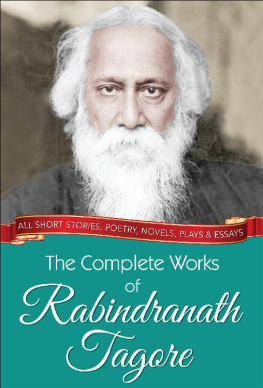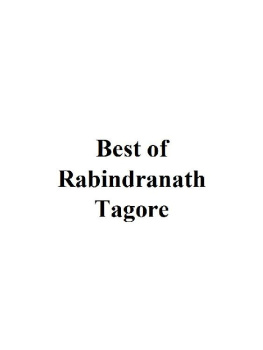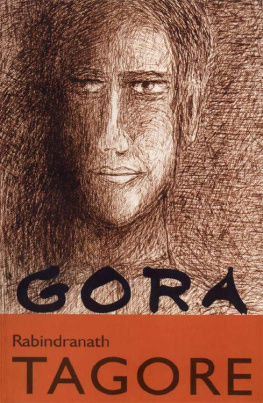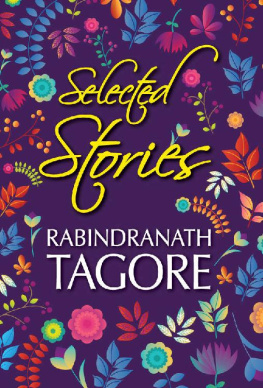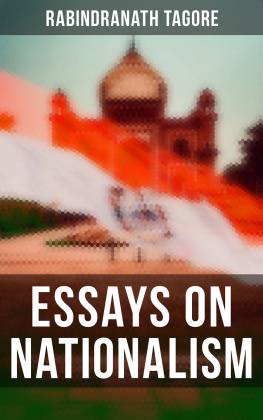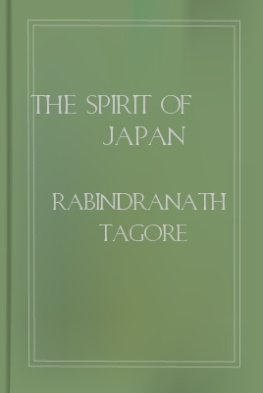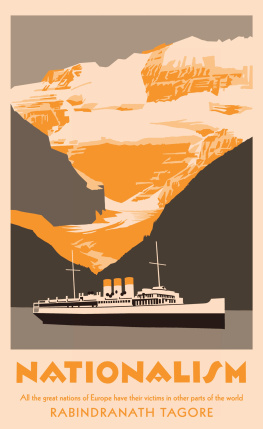Published by
GENERAL PRESS
4228/1, Ansari Road, Daryaganj
New Delhi 110002
Ph. : 011 23282971, 45795759
e-mail : generalpressindia@gmail.com
www.generalpress.in
General Press
All rights reserved. No part of this publication may be reproduced, stored in a retrieval system, or transmitted, in any form or by any meanselectronic, mechanical, photocopying, recording or otherwisewithout the prior written permission of the publishers.
First Edition : February 2017
ISBN : 9788180320798
2 6 0 5 2 0 1 7
Contents
Introduction
The Works of Rabindranath Tagore consist of poems, novels, short stories, dramas, and essays that Bengali poet and Brahmo philosopher Rabindranath Tagore created over his lifetime. This ebook presents a collection of all major works of Tagore. A dynamic table of contents allows you to jump directly to the work selected.
Tagores literary reputation is disproportionately influenced very much by regard for his poetry; however, he also wrote novels, essays, short stories, travelogues, dramas, and thousands of songs. The poems of Rabindranath Tagore are among the most haunting and tender in Indian and in world literature, expressing a profound and passionate human yearning. His ceaselessly inventive works deal with such subjects as the interplay between God and the world, the eternal and transient, and with the paradox of an endlessly changing universe that is in tune with unchanging harmonies. Poems such as Earth and In the Eyes of a Peacock present a picture of natural processes unaffected by human concerns, while others, as in Recovery 14, convey the poets bewilderment about his place in the world.
Tagore introduced new prose and verse forms and the use of colloquial language into Bengali literature, thereby freeing it from traditional models based on classical Sanskrit. He was highly influential in introducing the best of Indian culture to the West and vice versa, and he is generally regarded as the outstanding creative artist of modern South Asia.
About the Author
Rabindranath Tagore (1861-1941) was the youngest son of Debendranath Tagore, a leader of the Brahmo Samaj. He was educated at home and although at seventeen he was sent to England for formal schooling, he did not finish his studies there. In his mature years, in addition to his many-sided literary activities, he managed the family estates, a project which brought him into close touch with common humanity and increased his interest in social reforms. He also started an experimental school at Shantiniketan where he tried his Upanishadic ideals of education. From time to time he participated in the Indian nationalist movement, though in his own non-sentimental and visionary way; and Gandhi, the political father of modern India, was his devoted friend. Tagore was knighted by the ruling British Government in 1915, but within a few years he resigned the honour as a protest against British policies in India.
Tagore had early success as a writer in his native Bengal. With his translations of some of his poems he became rapidly known in the West. In fact, his fame attained a luminous height, taking him across continents on lecture tours and tours of friendship. For the world he became the voice of Indias spiritual heritage; and for India, especially for Bengal, he became a great living institution.
Although, Tagore wrote successfully in all literary genres, he was first of all a poet. Among his fifty and odd volumes of poetry are Manasi (1890) {The Ideal One}, Sonar Tari (1894) {The Golden Boat}, Gitanjali (1910) {Song Offerings}, Gitimalya (1914) {Wreath of Songs}, and Balaka (1916) {The Flight of Cranes}. The English renderings of his poetry, which include The Gardener (1913), Fruit-Gathering (1916), and The Fugitive (1921), do not generally correspond to particular volumes in the original Bengali; and in spite of its title, Gitanjali: Song Offerings (1912), the most acclaimed of them, contains poems from other works besides its namesake. Tagores major plays are Raja (1910) {The King of the Dark Chamber}, Dakghar (1912) {The Post Office}, Achalayatan (1912) {The Immovable}, Muktadhara (1922) {The Waterfall}, and Raktakaravi (1926) {Red Oleanders}. He is the author of several volumes of short stories and a number of novels, among them Gora (1910), Ghare-Baire (1916) {The Home and the World}, and Yogayog (1929) {Crosscurrents}. Besides these, he wrote musical dramas, dance dramas, essays of all types, travel diaries, and two autobiographies, one in his middle years and the other shortly before his death in 1941. Tagore also left numerous drawings and paintings, and songs for which he wrote the music himself.
Poetry
1. Ama and Vinayaka
Night on the battlefield: AMA meets her father VINAYAKA .
AMA : Father!
VINAYAKA : Shameless wanton, you call me Father! You who did not shrink from a Mussulman husband!
AMA : Though you have treacherously killed my husband, yet you are my father; and I hold back a widows tears, lest they bring Gods curse on you. Since we have met on this battlefield after years of separation, let me bow to your feet and take my last leave!
VINAYAKA : Where will you go, Ama? The tree on which you built your impious nest is hewn down. Where will you take shelter?
AMA : I have my son.
VINAYAKA : Leave him! Cast never a fond look back on the result of a sin expiated with blood! Think where to go.
AMA : Deaths open gates are wider than a fathers love!
VINAYAKA : Death indeed swallows sins as the sea swallows the mud of rivers. But you are to die neither to-night nor here. Seek some solitary shrine of holy Shiva far from shamed kindred and all neighbours; bathe three times a day in sacred Ganges, and, while reciting Gods name, listen to the last bell of evening worship, that Death may look tenderly upon you, as a father on his sleeping child whose eyes are still wet with tears. Let him gently carry you into his own great silence, as the Ganges carries a fallen flower on its stream, washing every stain away to render it, a fit offering, to the sea.
AMA : But my son
VINAYAKA : Again I bid you not to speak of him. Lay yourself once more in a fathers arms, my child, like a babe fresh from the womb of Oblivion, your second mother.
AMA : To me the world has become a shadow. Your words I hear, but cannot take to heart. Leave me, father, leave me alone! Do not try to bind me with your love, for its bands are red with my husbands blood.
VINAYAKA : Alas! No flower ever returns to the parent branch it dropped from. How can you call him husband who forcibly snatched you from Jivaji to whom you had been sacredly affianced? I shall never forget that night! In the wedding hall we sat anxiously expecting the bridegroom, for the auspicious hour was dwindling away. Then in the distance appeared the glare of torches, and bridal strains came floating up the air. We shouted for joy: women blew their conch-shells. A procession of palanquins entered the courtyard: but while we were asking, Where is Jivaji? armed men burst out of the litters like a storm, and bore you off before we knew what had happened. Shortly after, Jivaji came to tell us he had been waylaid and captured by a Mussulman noble of the Vijapur court. That night Jivaji and I touched the nuptial fire and swore bloody death to this villain. After waiting long, we have been freed from our solemn pledge to-night; and the spirit of Jivaji, who lost his life in this battle, lawfully claims you for wife.
AMA : Father, it may be that I have disgraced the rites of your house, but my honour is unsullied; I loved him to whom I bore a son. I remember the night when I received two secret messages, one from you, one from my mother; yours said: I send you the knife; kill him! My mothers: I send you the poison; end your life! Had unholy force dishonoured me, your double bidding had been obeyed. But my body was yielded only after love had given melove all the greater, all the purer, in that it overcame the hereditary recoil of our blood from the Mussulman.


